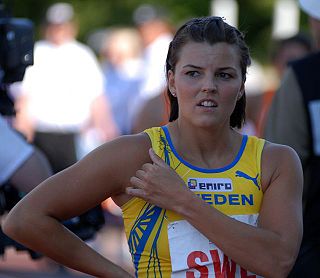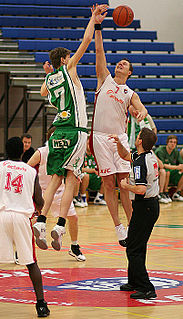A placing table is a team ranking system used in sports competitions that feature multiple finals. It shares similarities with the better-known medal table found at most multi-sport events, but goes beyond the top three performers and assigns weighted scores to each athlete based on their overall final placing, then aggregates the scores of all athletes in a team to provide a final team standing. This system is most commonly found in the sport of athletics: both the International Association of Athletics Federations (IAAF) and European Athletics release placing tables for the major championships they organise. A typical system awards a decreasing number of points for the top eight finishers, with eight points for first place, down to one point for eighth place. Non-finishers and disqualified athletes typically receive zero points. [1] [2] [3]
A ranking is a relationship between a set of items such that, for any two items, the first is either 'ranked higher than', 'ranked lower than' or 'ranked equal to' the second. In mathematics, this is known as a weak order or total preorder of objects. It is not necessarily a total order of objects because two different objects can have the same ranking. The rankings themselves are totally ordered. For example, materials are totally preordered by hardness, while degrees of hardness are totally ordered. If two items are the same in rank it is considered a tie.

Sport includes all forms of competitive physical activity or games which, through casual or organised participation, aim to use, maintain or improve physical ability and skills while providing enjoyment to participants, and in some cases, entertainment for spectators. Hundreds of sports exist, from those between single contestants, through to those with hundreds of simultaneous participants, either in teams or competing as individuals. In certain sports such as racing, many contestants may compete, simultaneously or consecutively, with one winner; in others, the contest is between two sides, each attempting to exceed the other. Some sports allow a "tie" or "draw", in which there is no single winner; others provide tie-breaking methods to ensure one winner and one loser. A number of contests may be arranged in a tournament producing a champion. Many sports leagues make an annual champion by arranging games in a regular sports season, followed in some cases by playoffs.

Competition arises whenever at least two parties strive for a goal which cannot be shared: where one's gain is the other's loss.
Contents
The advantage of a placing table over a traditional medal table is that it is a better indicator of the overall quality of a team – medal tables demonstrate a ranking bias in favour of teams with a small number of very high quality performers over larger teams with fewer medallists but a greater number of finalists. [4] Another advantage is that placing tables are less affected by post-competition doping disqualifications, as reassignment of a points score is a simple technical adjustment compared to the minting and re-presentation of physical medals. [5]
In competitive sports, doping is the use of banned athletic performance-enhancing drugs by athletic competitors. The term doping is widely used by organizations that regulate sporting competitions. The use of drugs to enhance performance is considered unethical, and therefore prohibited, by most international sports organizations, including the International Olympic Committee. Furthermore, athletes taking explicit measures to evade detection exacerbate the ethical violation with overt deception and cheating.
Several high profile international athletics competitions are contested via a placing table format, with no individual medals awarded. Major competitions of this type are the IAAF Continental Cup (formed as the IAAF World Cup in 1977), [6] the European Team Championships (formed as the European Cup in 1965), [7] the European Champion Clubs Cup (first held in 1975), [8] the DécaNation (created in 2005) and the Athletics World Cup (created in 2018). The European Athletics Indoor Cup, held from 2003 to 2008, is the highest level indoor track and field competition to have used a placing table system. [9] The ranking system was already in use in athletics at the start of the 20th century, being the deciding factor in the Finland-Sweden Athletics International since 1925. [10]
The IAAF Continental Cup is an international athletics track and field competition organized by the International Association of Athletics Federations (IAAF). It is the only world cup contested by teams representing continents, rather than national teams. The event takes place every four years in the even-year between Olympics.
The European Team Championships, also referred to as the European Athletics Team Championships is an international athletics competition organised by European Athletics, between different countries of Europe, over 4 leagues. It replaced the similar European Cup. Unlike most international competitions, medals are not awarded to individuals in individual events but to the overall winning team on a points system.
The European Cup is a former athletics competition for European teams that was replaced by the European Team Championships starting in 2009. The European Cup saw most of the major nations of Europe compete. Originally known as the Bruno Zauli Cup, it first took place in 1965 in Stuttgart (men) and Kassel (women), Germany. Initially, the competition was a bi-annual event ; however, from 1993, it took place once every year.
A small-scale version of a placing table is found in cross country running, where the team standing of a single race is decided by the aggregate placings of each team's athletes. [11] An alternative team scoring system exemplified by the European Throwing Cup is a performance-based team score, where each athlete's individual performance is converted into a score via a standardised points table and the team score is the aggregate of these performance scores, similar to a decathlon. [7]

Cross country running is a sport in which teams and individuals run a race on open-air courses over natural terrain such as dirt or grass. Sometimes the runners are referred to as harriers (dogs). The course, typically 4–12 kilometres (2.5–7.5 mi) long, may include surfaces of grass, and earth, pass through woodlands and open country, and include hills, flat ground and sometimes gravel road. It is both an individual and a team sport; runners are judged on individual times and teams by a points-scoring method. Both men and women of all ages compete in cross country, which usually takes place during autumn and winter, and can include weather conditions of rain, sleet, snow or hail, and a wide range of temperatures.
The European Throwing Cup is an annual continental athletics competition for athletes specialising in the events of discus, javelin and hammer throwing and the shot put. The winter event, organised every March by the European Athletics Association, is intended as a counterbalance to the fact that indoor track and field meetings cannot host the longer throwing events. It allows athletes who specialise in throwing events to gauge their form for the forthcoming outdoor athletics season.

The decathlon is a combined event in athletics consisting of ten track and field events. The word "decathlon" was formed, in analogy to the word "pentathlon", from Greek δέκα and ἄθλος. Events are held over two consecutive days and the winners are determined by the combined performance in all. Performance is judged on a points system in each event, not by the position achieved. The decathlon is contested mainly by male athletes, while female athletes typically compete in the heptathlon.







